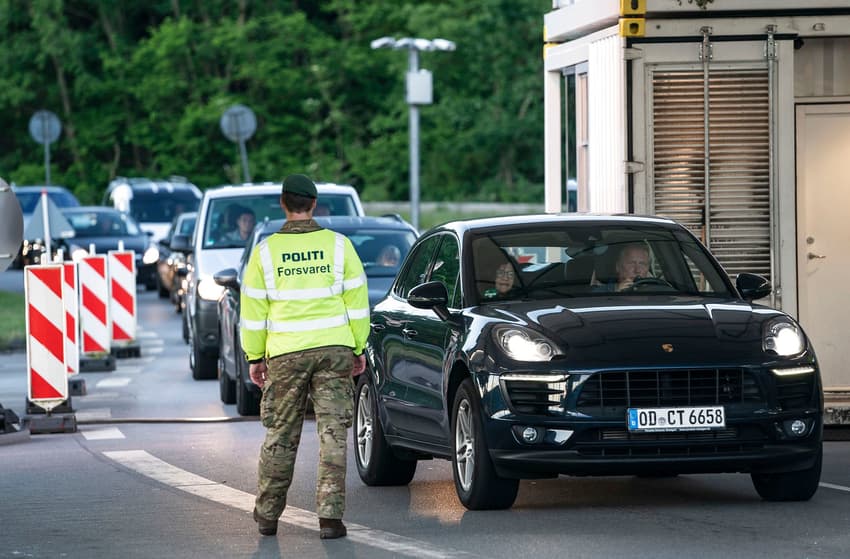Denmark confirms latest extension of checks at German border

The checks carried out by Danish police on the border with Germany have been extended by another six months, Copenhagen has confirmed.
The border control is technically temporary but has been in place since January 2016. The latest extension takes effect on November 12th and will therefore take the checks into an eighth year.
Danish Justice Minister Mattias Tesfaye confirmed the extension in a note to the parliamentary Justice Committee on Monday.
Tesfaye has also written to EU Commissioner for Home Affairs Ylva Johansson to confirm the ongoing border controls.
Addiotnally, Tesfaye said that the Russian invasion of Ukraine increases the risk of persons “who could represent a threat to Denmark” travelling into the Schengen zone.
Under the rules of the Schengen agreement, countries can place temporary border controls under exceptional circumstances. After a six-month period, the temporary checks must be renewed.
Denmark initially cited the refugee crisis of late 2015 for implementing checks, and now states the “security and migration situation” as its justification, in reference to what it says is a threat of organised crime and terrorism.
In practice, border control means long queues often occur when entering Denmark by road from Germany as police pull aside vehicles for spot checks.
Spot checks can also occur on the Denmark-Sweden border under the Danish temporary arrangement. Sweden also carries out checks on its border with Denmark.
READ ALSO: Swedish PM calls for ‘permanent border control’ with Denmark
In the letter to the EU Commission, Tesfaye provides several data related to the spot checks on the border with Germany.
Between January and August this year, 202 weapons were confiscated by Danish authorities at the border. Just under 2,000 people were refused entry to Denmark at the border.
Denial of entry is most likely to be a result of not being able to provide the correct documentation.
Three left-leaning parties in the Danish parliament – the Red Green Alliance, Socialist People’s Party (SF) and Social Liberals (Radikale Venstre) -- want the border controls to be scrapped.
Red Green Alliance justice spokesperson Rosa Lund said police resources should be used elsewhere and rejected justifications for the ongoing controls provided by Tesfaye.
“I think it is a completely hopeless use of police resources that they, in a situation where we no longer have the coronavirus pandemic hanging over us, have to stand at the border and check,” Lund said.
The decision of whether to conduct border checks should lie with the police, rather than the government, she also argued.
“This isn’t something we should sit and regulate from [parliament],” she said.
Denmark’s border control cost taxpayers 1.25 billion kroner between January 2016 and June 2019, according to national broadcaster DR.
READ ALSO: German politician complains to Denmark over border control
Comments
See Also
The border control is technically temporary but has been in place since January 2016. The latest extension takes effect on November 12th and will therefore take the checks into an eighth year.
Danish Justice Minister Mattias Tesfaye confirmed the extension in a note to the parliamentary Justice Committee on Monday.
Tesfaye has also written to EU Commissioner for Home Affairs Ylva Johansson to confirm the ongoing border controls.
Addiotnally, Tesfaye said that the Russian invasion of Ukraine increases the risk of persons “who could represent a threat to Denmark” travelling into the Schengen zone.
Under the rules of the Schengen agreement, countries can place temporary border controls under exceptional circumstances. After a six-month period, the temporary checks must be renewed.
Denmark initially cited the refugee crisis of late 2015 for implementing checks, and now states the “security and migration situation” as its justification, in reference to what it says is a threat of organised crime and terrorism.
In practice, border control means long queues often occur when entering Denmark by road from Germany as police pull aside vehicles for spot checks.
Spot checks can also occur on the Denmark-Sweden border under the Danish temporary arrangement. Sweden also carries out checks on its border with Denmark.
READ ALSO: Swedish PM calls for ‘permanent border control’ with Denmark
In the letter to the EU Commission, Tesfaye provides several data related to the spot checks on the border with Germany.
Between January and August this year, 202 weapons were confiscated by Danish authorities at the border. Just under 2,000 people were refused entry to Denmark at the border.
Denial of entry is most likely to be a result of not being able to provide the correct documentation.
Three left-leaning parties in the Danish parliament – the Red Green Alliance, Socialist People’s Party (SF) and Social Liberals (Radikale Venstre) -- want the border controls to be scrapped.
Red Green Alliance justice spokesperson Rosa Lund said police resources should be used elsewhere and rejected justifications for the ongoing controls provided by Tesfaye.
“I think it is a completely hopeless use of police resources that they, in a situation where we no longer have the coronavirus pandemic hanging over us, have to stand at the border and check,” Lund said.
The decision of whether to conduct border checks should lie with the police, rather than the government, she also argued.
“This isn’t something we should sit and regulate from [parliament],” she said.
Denmark’s border control cost taxpayers 1.25 billion kroner between January 2016 and June 2019, according to national broadcaster DR.
READ ALSO: German politician complains to Denmark over border control
Join the conversation in our comments section below. Share your own views and experience and if you have a question or suggestion for our journalists then email us at [email protected].
Please keep comments civil, constructive and on topic – and make sure to read our terms of use before getting involved.
Please log in here to leave a comment.